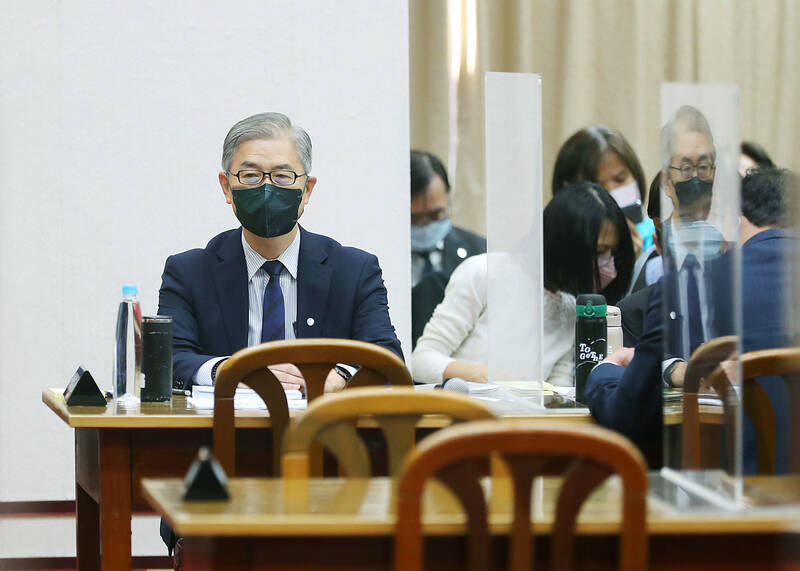Despite the National Development Council’s (NDC) business climate monitor flashing “yellow-blue” for the first time in 26 months, indicating sluggish business, local publicly traded companies still reported revenue growth and showed solid fundamentals, Financial Supervisory Commission (FSC) Chairman Thomas Huang (黃天牧) said yesterday.
Huang’s comment came as investors mulled over whether the FSC would implement the short-selling ban on all local stocks after the TAIEX benchmark index continued its downtrend, falling 1.07 percent to 12,788.42 points.
The commission accounts for the business climate monitor when adjusting its policy, but local companies have operated securely, with combined revenues growing about 10 percent year-on-year for the first three quarters, Huang said.

Photo: CNA
The average yield of local stocks stands at 5.34 percent and the price-earnings ratio tallied 9.4, suggesting that the fundamentals of local stocks are strong, he added.
FSC data show that the monetary valuation of all local and foreign shares held by local financial sectors plunged to NT$2.6 trillion (US$80.88 billion) at the end of last month, down 16 percent from NT$3.1 trillion a month earlier,.
Local banks were the biggest share sellers, off-loading NT$136.5 billion of local shares last month, while local brokerages sold about NT$3.7 billion of local shares, the commission’s data showed.
Only local life insurance companies bought more local shares last month. The combined valuation of local shares held by local life insurers dropped to NT$1.59 trillion at the end of last month, the lowest in 30 months, the commission’s data showed.
Turnover in local stocks totaled NT$172.7 billion yesterday, while foreign institutional investors sold a net NT$11.85 billion of local shares, with weighted stocks such as Taiwan Semiconductor Manufacturing Co (台積電), MediaTek Inc (聯發科) and Evergreen Marine Corp (長榮海運) suffering the brunt, Taiwan Stock Exchange data showed.
Foreign institutional investors sold a net NT$10.4 billion of local shares this week, much less than NT$50.24 billion a week earlier, the data showed.

Shares in Taiwan closed at a new high yesterday, the first trading day of the new year, as contract chipmaker Taiwan Semiconductor Manufacturing Co (TSMC, 台積電) continued to break records amid an artificial intelligence (AI) boom, dealers said. The TAIEX closed up 386.21 points, or 1.33 percent, at 29,349.81, with turnover totaling NT$648.844 billion (US$20.65 billion). “Judging from a stronger Taiwan dollar against the US dollar, I think foreign institutional investors returned from the holidays and brought funds into the local market,” Concord Securities Co (康和證券) analyst Kerry Huang (黃志祺) said. “Foreign investors just rebuilt their positions with TSMC as their top target,

REVENUE PERFORMANCE: Cloud and network products, and electronic components saw strong increases, while smart consumer electronics and computing products fell Hon Hai Precision Industry Co (鴻海精密) yesterday posted 26.51 percent quarterly growth in revenue for last quarter to NT$2.6 trillion (US$82.44 billion), the strongest on record for the period and above expectations, but the company forecast a slight revenue dip this quarter due to seasonal factors. On an annual basis, revenue last quarter grew 22.07 percent, the company said. Analysts on average estimated about NT$2.4 trillion increase. Hon Hai, which assembles servers for Nvidia Corp and iPhones for Apple Inc, is expanding its capacity in the US, adding artificial intelligence (AI) server production in Wisconsin and Texas, where it operates established campuses. This

H200 CHIPS: A source said that Nvidia has asked the Taiwanese company to begin production of additional chips and work is expected to start in the second quarter Nvidia Corp is scrambling to meet demand for its H200 artificial intelligence (AI) chips from Chinese technology companies and has approached contract manufacturer Taiwan Semiconductor Manufacturing Co (TSMC, 台積電) to ramp up production, sources said. Chinese technology companies have placed orders for more than 2 million H200 chips for this year, while Nvidia holds just 700,000 units in stock, two of the people said. The exact additional volume Nvidia intends to order from TSMC remains unclear, they said. A third source said that Nvidia has asked TSMC to begin production of the additional chips and work is expected to start in the second

US President Donald Trump on Friday blocked US photonics firm HieFo Corp’s US$3 million acquisition of assets in New Jersey-based aerospace and defense specialist Emcore Corp, citing national security and China-related concerns. In an order released by the White House, Trump said HieFo was “controlled by a citizen of the People’s Republic of China” and that its 2024 acquisition of Emcore’s businesses led the US president to believe that it might “take action that threatens to impair the national security of the United States.” The order did not name the person or detail Trump’s concerns. “The Transaction is hereby prohibited,”